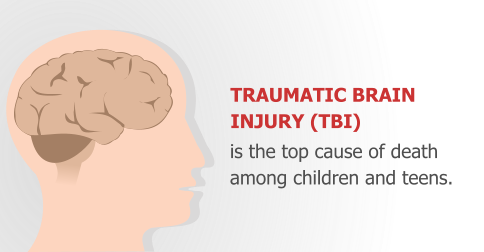
Traumatic brain injury (TBI) is the top cause of death among children and teens, according to the Centers for Disease Control and Prevention (CDC). TBIs, which are caused by a bump or blow to the head that disrupts normal brain function, can range from mild to very severe.
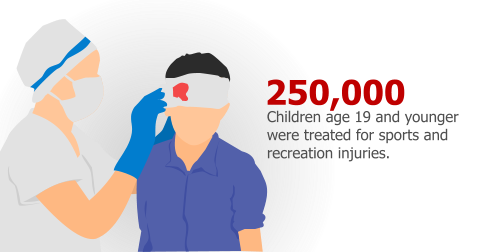 Most TBIs take the form of a concussion. While concussions are most closely associated with professional football, they can also happen to children during all kinds of activities. In a single recent year, nearly 250,000 children age 19 and younger were treated for sports and recreation injuries that included a concussion, according to the CDC.
Most TBIs take the form of a concussion. While concussions are most closely associated with professional football, they can also happen to children during all kinds of activities. In a single recent year, nearly 250,000 children age 19 and younger were treated for sports and recreation injuries that included a concussion, according to the CDC.
From 2001 to 2009, the rate of emergency room visits for concussions from sports and recreation injuries rose 57 percent among children. Considering this increase in the number of concussions, here are eight things for parents to watch out for when it comes to TBIs:
- Falls are the most common cause of TBIs among children ages 0-14, according to the CDC, accounting for 55 percent of injuries. For older teens, car crashes are the most common cause.
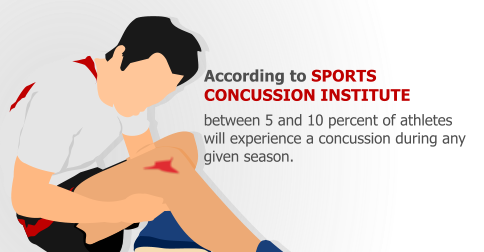
- Between 5 and 10 percent of athletes will experience a concussion during any given season, according to the Sports Concussion Institute. Most of these concussions – 78 percent – happen during games rather than during practice. For males, football is the most common sport for concussions, with a 75 percent chance of a concussion. For females, soccer is the most common sport, with a 50 percent chance of a concussion. The impact of a football player tackling a stationary player is 25 miles per hour, and the impact speed of a soccer ball headed by a player is 70 miles per hour.
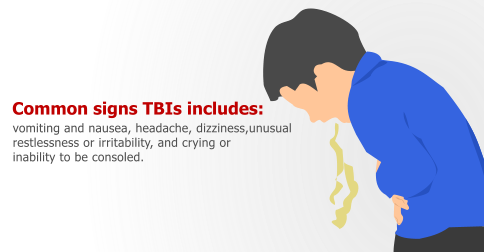
- Symptoms of TBI vary greatly, and if a child is very young, they can be hard to pinpoint. Common signs include vomiting and nausea, headache, dizziness, unusual restlessness or irritability, and crying or inability to be consoled. Impaired cognitive function, physical abilities or communication skills are also symptoms of TBI. You know your children better than anyone, and you can tell if they are not acting like they normally would. Children with TBI symptoms should be taken to the doctor or emergency room right away.
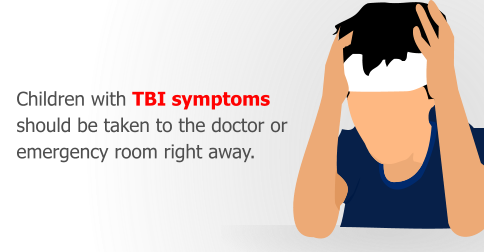
- Among athletes, less than 10 percent of those with sports-related concussions lose consciousness, according to the Sports Concussion Institute. Headache and dizziness are the most common symptoms reported right after a concussion injury. Symptoms that last long after the initial injury are of particular concern.
- Returning to normal activities can be a slow process and should happen only when the doctor says it is time. Severe concussions and TBI may mean injured children will have to miss school or other activities. They might need support when they are ready to return. For children injured while playing a sport, a doctor should make the call about when it is safe to return to the game.
- Children’s brains are still developing, which means that a TBI may actually be more devastating for a child than for an adult. Cognitive impairments might not be obvious right after the injury but may emerge later on, creating learning and social challenges for children with TBI.
- Treatment depends on the severity and type of TBI, and can include care from neurologists and other specialists. For a concussion, rest is key, and often includes complete rest from all mental and physical stimuli. Follow-up medical care is vital, especially for severe brain injuries where the child has to regain cognitive or other functions.
- Preventing falls and other accidents can prevent TBIs. Steps to avoid TBIs among children include always wearing a seatbelt in a car, wearing a helmet while riding a bicycle or skating, making sure playgrounds have shock-absorbing materials, using protective equipment during sports, securing rugs and using rubber mats in bathtubs.
If your child has been involved in an accident resulting in a TBI, it’s important to contact an experienced personal injury attorney as soon as possible to go over your legal options. If someone else’s negligence was responsible for your child’s injury, you may be entitled to significant compensation for medical bills, pain and suffering and other losses.
Sources:
- Brain Injury Association of America – Brain Injury in Children
- CDC – Traumatic Brain Injury in the United States: Fact Sheet
- Sports Concussion Institute – Concussion Facts
- org – Children with Traumatic Brain Injury: A Parents’ Guide
- org – Pediatric Traumatic Brain Injury
- Boston Children’s Hospital – Head or brain injury in children

































